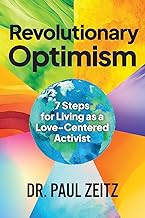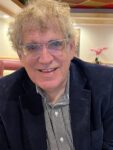Book review: “Revolutionary optimism” must be tempered with reality

Revolutionary optimism by Paul Zeitz; Unify Movements Press (c) 2024; ISBN 9798990-264304; 272 pages, $18.99
By Rabbi Dr. Michael Leo Samuel

CHULA VISTA, Calif. — At first I thought Dr. Paul Zeitz seemed like a child of the ’60s. But after reading his book, I realized there is much more to his life story. Drawing on his experiences as a physician and epidemiologist and his personal journey toward self-compassion and love, Zeitz reveals himself to be a true healer who cares about the well-being of his patients, the community and the world.
What inspired him to write a book about revolutionary optimism? Was he always an optimist? Part of his spiritual journey was to move from a pessimistic worldview to a more optimistic outlook. He was involved in numerous social causes that focused on love, personal transformation and spiritual awakening. In Revolutionary optimismZeitz describes seven steps that can help individuals change the world for the better. While the individual steps are not explicitly described, the book emphasizes developing self-compassion, adopting love as a guiding principle, and engaging in meaningful activism.
The seven steps likely involve a combination of inner work, such as developing self-awareness, mindfulness, and gratitude, and outer actions, such as participating in social movements, advocating for justice, and promoting peace. Zeitz emphasizes the importance of political imagination, envisioning a better future, and taking concrete steps to make it a reality. He encourages readers to adopt a “fail-forward” mindset, learning from setbacks and using them as opportunities for growth and renewed commitment.
One of the central themes of his book is a call for a declaration of interdependence. He writes: “We, the people of the United States, declare our interdependence with one another, with all humanity, with all life, and with our Earth. We commit ourselves to respect the full equality and dignity of all living beings and to uphold the rule of law through a truly democratic government. Love will be at the center of our society to achieve collective healing, justice, and transformation.” This declaration underscores the importance of community, mutual respect, and love in building a better future.
Zeitz’s commitment as an activist is deeply rooted in Jewish tradition. His focus on Tikkun Olam (Repairing the World) is consistent with the Jewish commitment to actively improve the world. His emphasis Chesed (Loving Kindness) is consistent with the Jewish value of empathy and concern for others. Zeitz’s focus on self-compassion and personal growth reflects the Jewish concept of Chechuva (remorse), emphasizing continuous self-reflection and improvement. His persistent optimism can be seen as a form of Bitachon (trust in God) and his commitment to justice are in line with the Jewish value of Tzedek (Justice).
However, the book does not address the problem of radical evil. Zeitz’s idealism and focus on global problems such as climate change do not adequately take into account the existential threats posed by radical ideologies. The horrors of October 7, when many Israelis who embodied Zeitz’s values were killed by people who harbored genocide, are a stark reminder that optimism must be tempered by a realistic understanding of evil. The totalitarian threats to freedom and independence require more than idealistic solutions; they require a comprehensive strategy to ensure the survival of humanity.
Finally, Revolutionary Optimism: 7 Steps to Living as a Love-Centered Activist is an inspiring guide for anyone who wants to make a positive impact on the world. Zeitz offers valuable insights into personal and social transformation rooted in love and compassion. However, the book could benefit from a deeper examination of the systemic threats to global peace and stability. Zeitz’s message of hope and activism is powerful, but it must be accompanied by a clear understanding of the challenges we face today.
*
Rabbi Michael Leo Samuel is spiritual leader of Temple Beth Shalom in Chula Vista, California.



